Search titles
Displaying results 21 to 30 of 38.
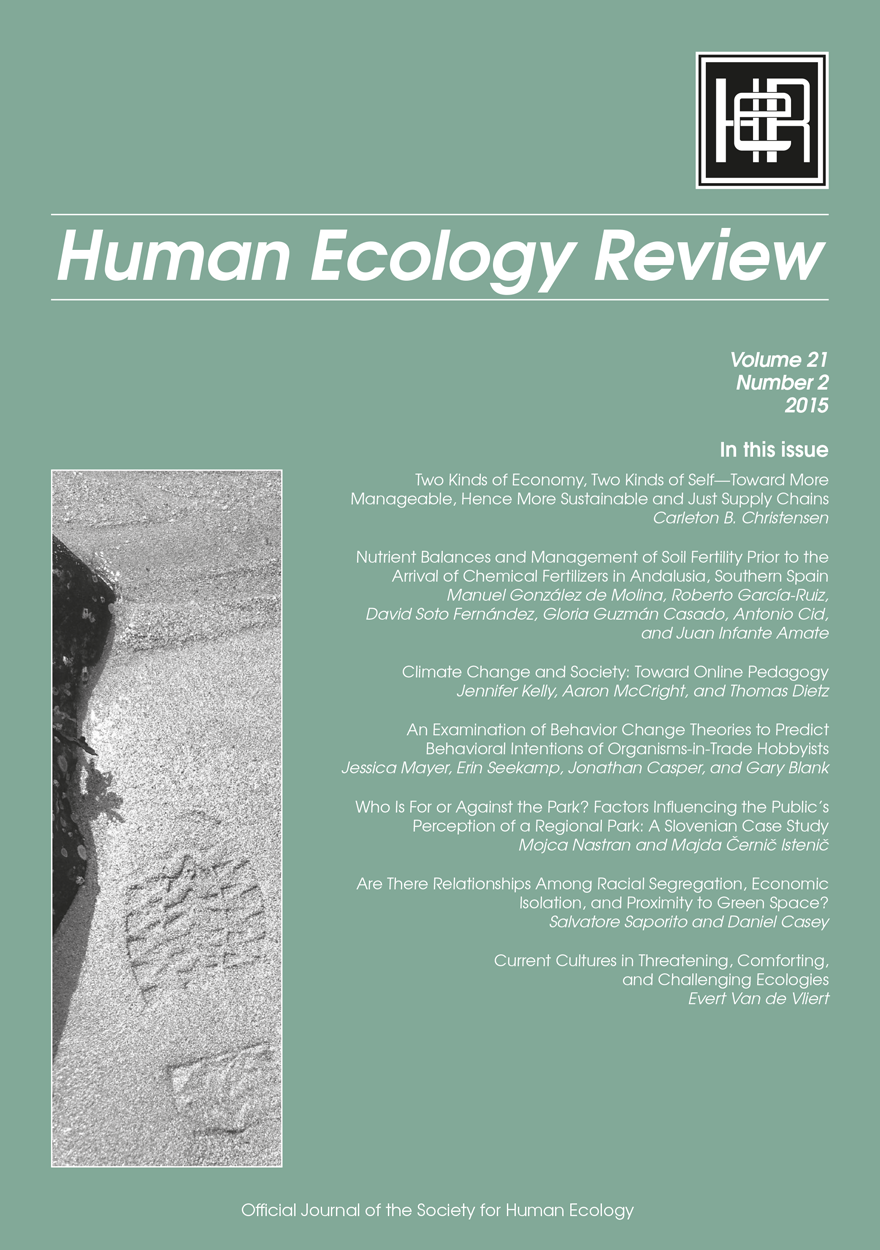
Human Ecology Review: Volume 21, Number 2 »
Publication date: September 2015
Human Ecology Review is a semi-annual journal that publishes peer-reviewed interdisciplinary research on all aspects of human–environment interactions (Research in Human Ecology). The journal also publishes essays, discussion papers, dialogue, and commentary on special topics relevant to human ecology (Human Ecology Forum), book reviews (Contemporary Human Ecology), and letters, announcements, and other items of interest (Human Ecology Bulletin). Human Ecology Review also publishes an occasional paper series in the Philosophy of Human Ecology and Social–Environmental Sustainability.
Download for free
Not available for purchase
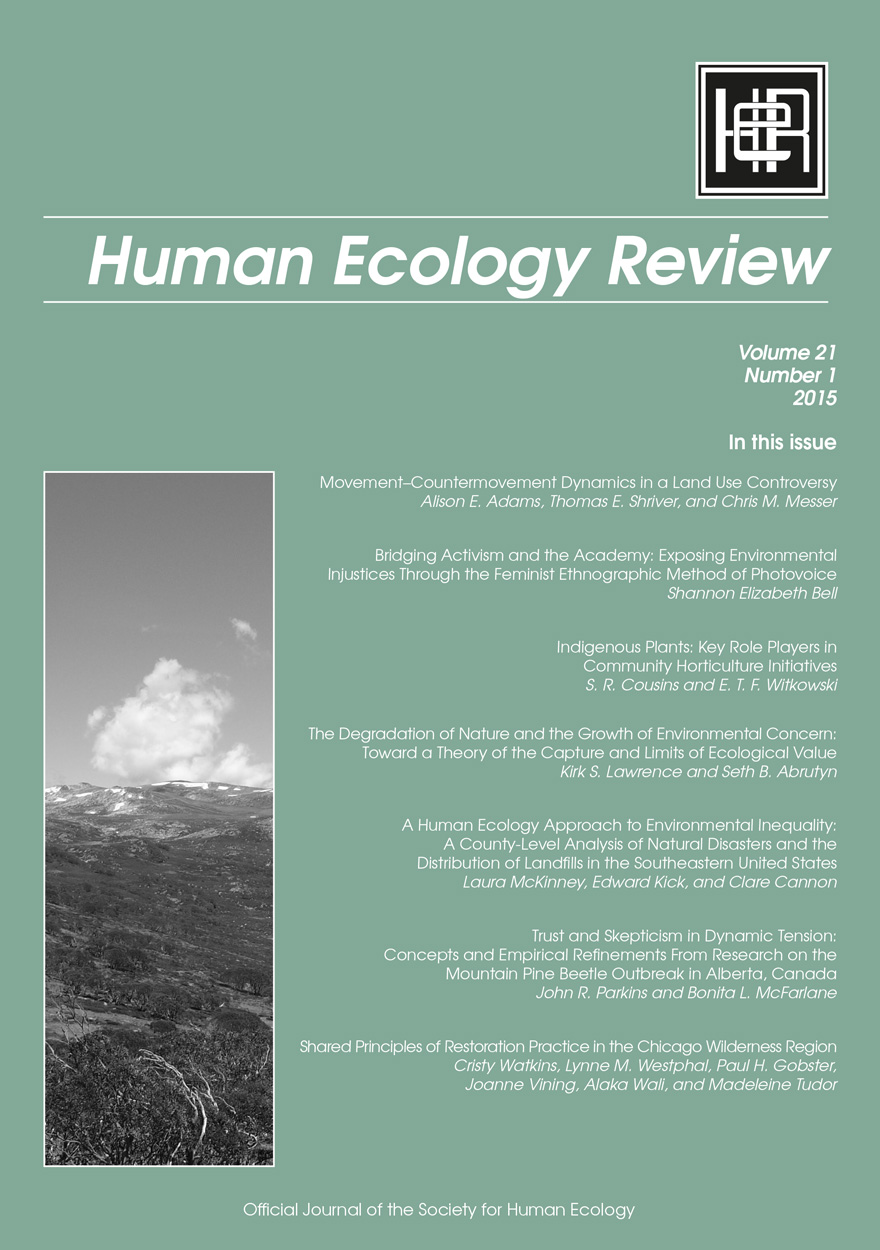
Human Ecology Review: Volume 21, Number 1 »
Publication date: February 2015
Human Ecology Review is a semi-annual journal that publishes peer-reviewed interdisciplinary research on all aspects of human–environment interactions (Research in Human Ecology). The journal also publishes essays, discussion papers, dialogue, and commentary on special topics relevant to human ecology (Human Ecology Forum), book reviews (Contemporary Human Ecology), and letters, announcements, and other items of interest (Human Ecology Bulletin). Human Ecology Review also publishes an occasional paper series in the Philosophy of Human Ecology and Social–Environmental Sustainability.
Download for free
Not available for purchase

Agenda - A Journal of Policy Analysis and Reform: Volume 21, Number 1, 2014 »
Edited by: William Coleman
Publication date: November 2014
Agenda is a refereed, ECONLIT-indexed and RePEc-listed journal of the College of Business and Economics, The Australian National University. Launched in 1994, Agenda provides a forum for debate on public policy, mainly (but not exclusively) in Australia and New Zealand. It deals largely with economic issues but gives space to social and legal policy and also to the moral and philosophical foundations and implications of policy.
Subscribe to the Agenda Alerting service if you wish to be advised on forthcoming or new issues.
Download for free
Not available for purchase
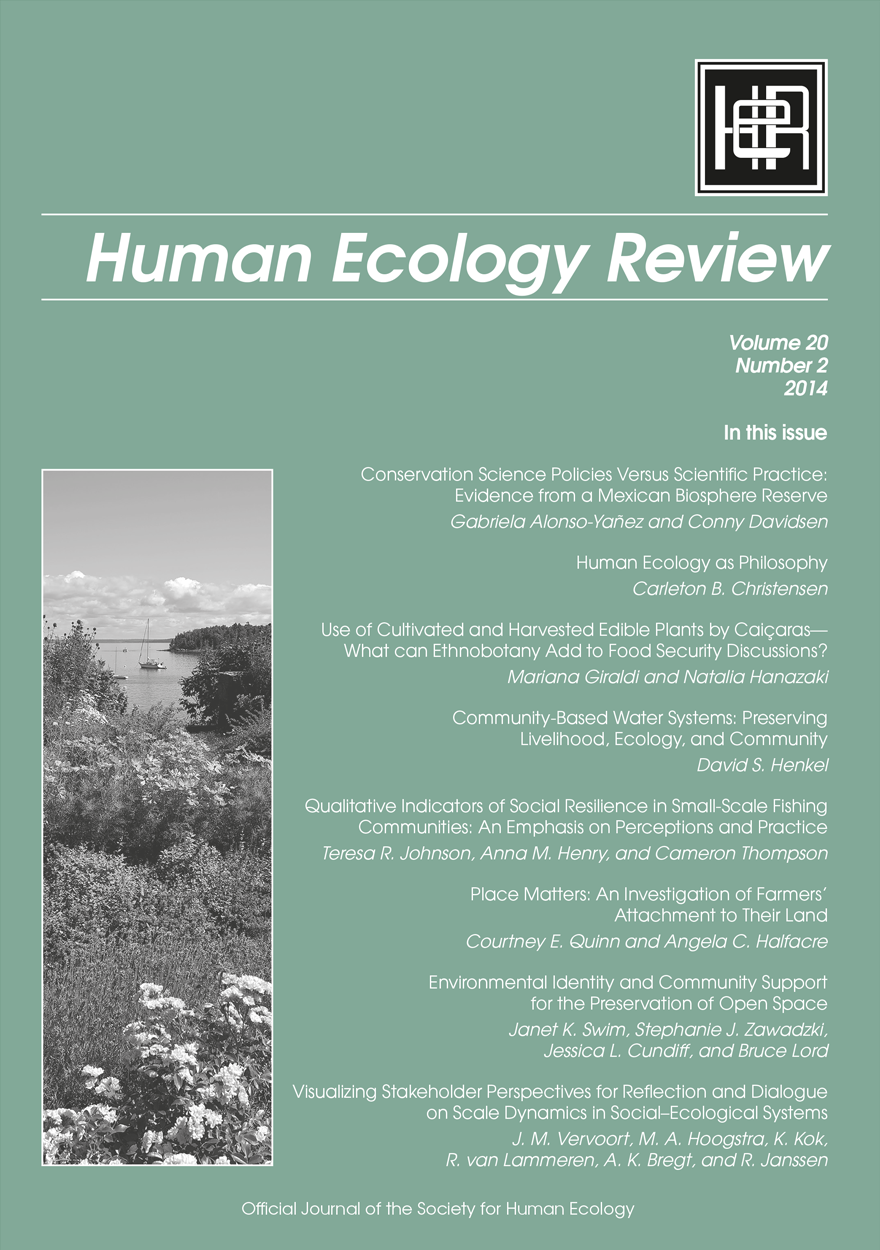
Human Ecology Review: Volume 20, Number 2 »
Publication date: September 2014
Human Ecology Review is a semi-annual journal that publishes peer-reviewed interdisciplinary research on all aspects of human–environment interactions (Research in Human Ecology). The journal also publishes essays, discussion papers, dialogue, and commentary on special topics relevant to human ecology (Human Ecology Forum), book reviews (Contemporary Human Ecology), and letters, announcements, and other items of interest (Human Ecology Bulletin). Human Ecology Review also publishes an occasional paper series in the Philosophy of Human Ecology and Social–Environmental Sustainability.
Download for free
Not available for purchase
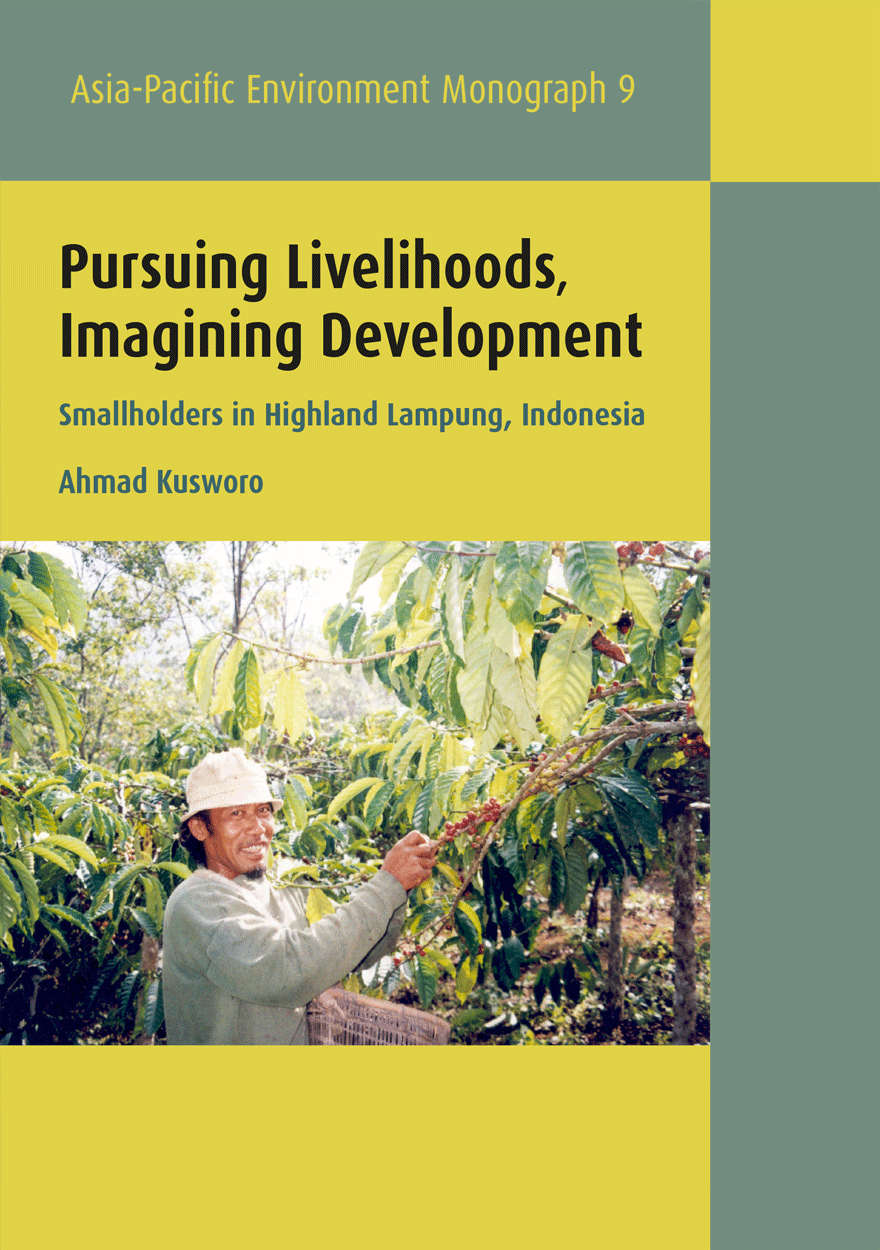
Pursuing Livelihoods, Imagining Development »
Smallholders in Highland Lampung, Indonesia
Authored by: Ahmad Kusworo
Publication date: January 2014
This monograph explores the ways in which people experience ‘development’ and how development shapes and maintains their lives. The discussion begins with Lampung Province, moves to one of the province’s highland regions, and ends in a village in this highland region. Colonial and post-colonial initiatives drove the transformation of Lampung in the twentieth century bringing mixed results and effects including rapid growth in agricultural production, the formation of ‘wealthy zones’ in some areas, and the creation of pockets of poverty in other areas. In Sumber Jaya and the highlands of Way Tenong, migrants have transformed one of Lampung’s last frontier regions into one of its ‘wealthy zones’. Although the bulk of these migrants migrated spontaneously, they were integrated within the framework of planned development. The level of progress that the region has achieved is largely the result of villagers’ efforts to bring state resources to the village. In conflict with forestry authorities for decades, farmers in some villages have agreed to establish a new relationship with authorities, but the struggle for control over land resources continues.
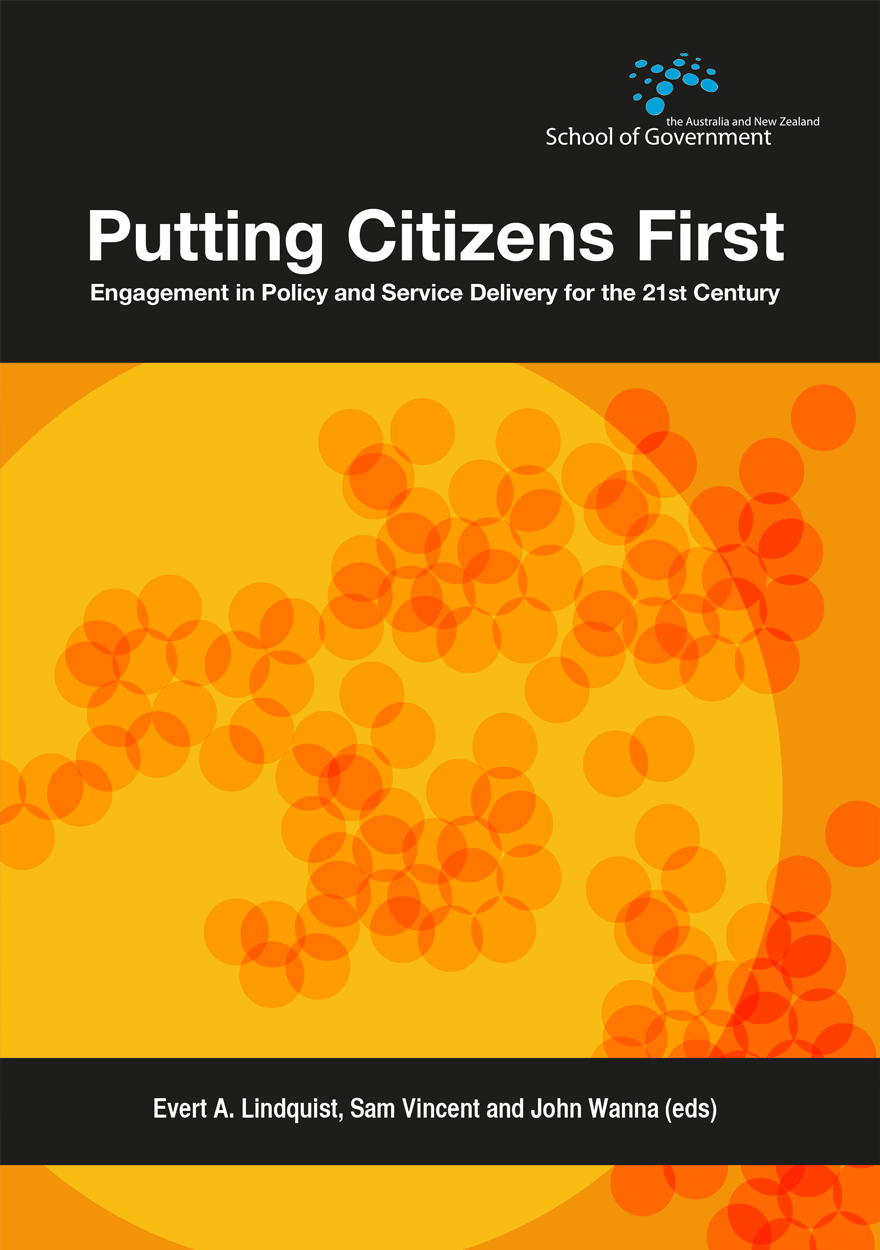
Putting Citizens First »
Engagement in Policy and Service Delivery for the 21st Century
Publication date: August 2013
This book explores the ways in which governments are putting citizens first in their policy-making endeavours. Making citizens the focus of policy interventions and involving them in the delivery and design is for many governments a normative ideal; it is a worthy objective and sounds easy to achieve. But the reality is that putting citizens at the centre of policy-making is hard and confronting. Are governments really serious in their ambitions to put citizens first? Are they prepared for the challenges and demands such an approach will demand? Are they prepared to commit the time and resources to ensure genuine engagement takes place and that citizens’ interests are considered foremost? And, more importantly, are governments prepared for the trade-offs, risks and loss of control such citizen-centric approaches will inevitably involve?
The book is divided into five parts:
setting the scene: The evolving landscape for citizen engagement
drivers for change: Innovations in citizen-centric governance
case studies in land management and Indigenous empowerment
case studies in fostering community engagement and connectedness
case studies engaging with information technology and new media.
While some chapters question how far governments can go in engaging with citizens, many point to successful examples of actual engagement that enhanced policy experiences and improved service delivery. The various authors make clear that citizen engagement is not restricted to the domain of service delivery, but if taken seriously affects the ways governments conduct their activities across all agencies. The implications are enormous, but the benefits to public policy may be enormous too.

A New Idea Each Morning »
How food and agriculture came together in one international organisation
Authored by: Wendy Way
Publication date: May 2013
In the years between the two world wars of the twentieth century leaders in Western countries worried about a food surplus. The hardships of the Great Depression were intensified by a glut of wheat and consequent low prices on the world market. Yet at the same time nutrition scientists protested that significant proportions of populations, even in affluent countries, were unable to afford a diet ‘adequate for health’. Fresh fruits, vegetables, dairy products and meat were out of reach for the poor.
This book traces the work of three men who sought to bring together the interests of farmers and the needs of the hungry: scientist and passionate campaigner for better nutrition, John Boyd Orr; Australian politician and international statesman, Stanley Melbourne Bruce; and Economic Adviser to Bruce at the Australian High Commission in London, Frank Lidgett McDougall. Bruce once said ‘McDougall brings me a new idea every morning’. One of those ideas became the genesis of their work, which helped bring about the formation of the Food and Agriculture Organization of the United Nations in 1945. All three undertook significant roles in the formative years of the organisation.
The story of this contribution to the international world order is little known. The cooperation, diplomacy and persistence of these men provides inspiration for tackling the alarming prospect of food shortages in the present century.
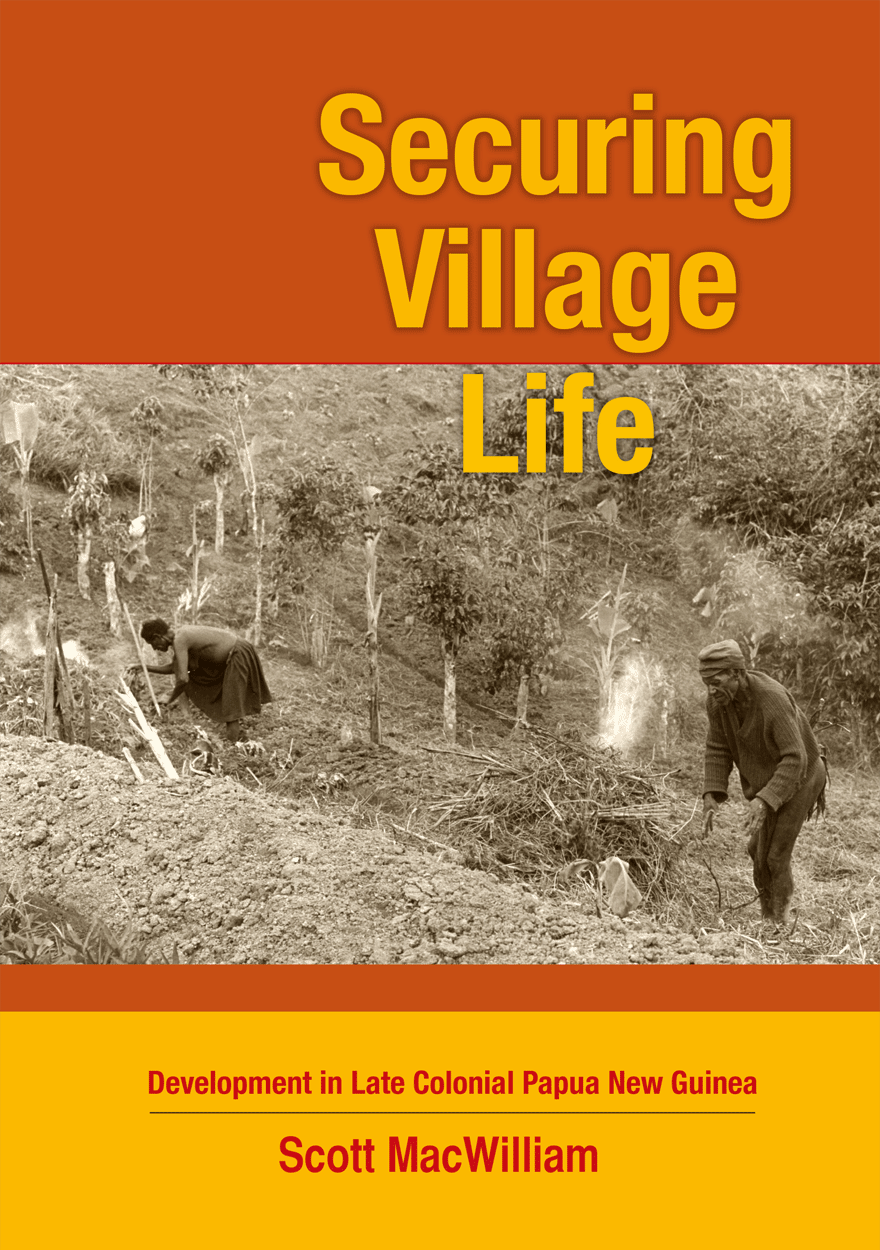
Securing Village Life »
Development in Late Colonial Papua New Guinea
Authored by: Scott MacWilliam
Publication date: May 2013
Securing Village Life: Development in Late Colonial Papua New Guinea examines the significance for post-World War II Australian colonial policy of the modern idea of development. Australian officials emphasised the importance of bringing development for both the colony of Papua and the United Nations Trust Territory of New Guinea. The principal form that development took involved securing smallholders against the tendencies of other forms of capitalist development that might have separated households from land. In order to make household occupation of their holdings more secure and at higher standards of living, the colonial administration coordinated and supervised increases in production of crops and other agricultural produce.
Contrary to suggestions that colonial policy and practice ignored indigenous agriculture and concentrated on plantation crops grown by international firms and expatriate owner-occupiers, the study shows how the main focus was instead upon increasing smallholder output for immediate consumption as well as for local and international markets. Simultaneously development stimulated increases in consumption, including of goods produced through manufacturing processes and imported into the colony.
Only as Independence approached was the pre-eminence of the earlier focus upon smallholders weakened. In part the change occurred due to the political advance of the indigenous capitalist class and their allies seeking to extend their base in largeholding agriculture and related commercial activities. This advance and the uncertainty over which form of development would prevail once indigenes held state power in post-colonial Papua New Guinea stood in marked contrast to the definite direction pursued under the colonial administration of the 1950s and early 1960s.

Conquering the Highlands »
A history of the afforestation of the Scottish uplands
Authored by: Jan Oosthoek
Publication date: February 2013
Deforestation of Scotland began millennia ago and by the early 20th century woodland cover was down to about 6 per cent of the total land area. A century later woodland cover had tripled. Most of the newly established forestry plantations were created on elevated land with wet peaty soils and high wind exposure, not exactly the condition in which forests naturally thrive. Jan Oosthoek tells in this book the story of how 20th century foresters devised ways to successfully reforest the poor Scottish uplands, land that was regarded as unplantable, to fulfil the mandate they had received from the Government and wider society to create a timber reserve. He raises the question whether the adopted forestry practice was the only viable means to create forests in the Scottish Highlands by examining debates within the forestry community about the appearance of the forests and their longterm ecological prospects. Finally, the book argues that the long held ecological convictions among foresters and pressure from environmentalists came together in the late 20th century to create more environmentally sensitive forestry.

East Asia Forum Quarterly: Volume 4, Number 4, 2012 »
Publication date: December 2012
East Asia Forum Quarterly grew out of East Asia Forum (EAF) online, which has developed a reputation for providing a platform for the best in Asian analysis, research and policy comment on the Asia Pacific region in world affairs. EAFQ aims to provide a further window onto research in the leading research institutes in Asia and to provide expert comment on current developments within the region. The East Asia Forum Quarterly, like East Asia Forum online, is an initiative of the East Asia Forum (EAF) and its host organisation, the East Asian Bureau of Economic Research (EABER) in the Crawford School of Economics and Government in the College of Asia & the Pacific at The Australian National University.
Download for free
Not available for purchase



